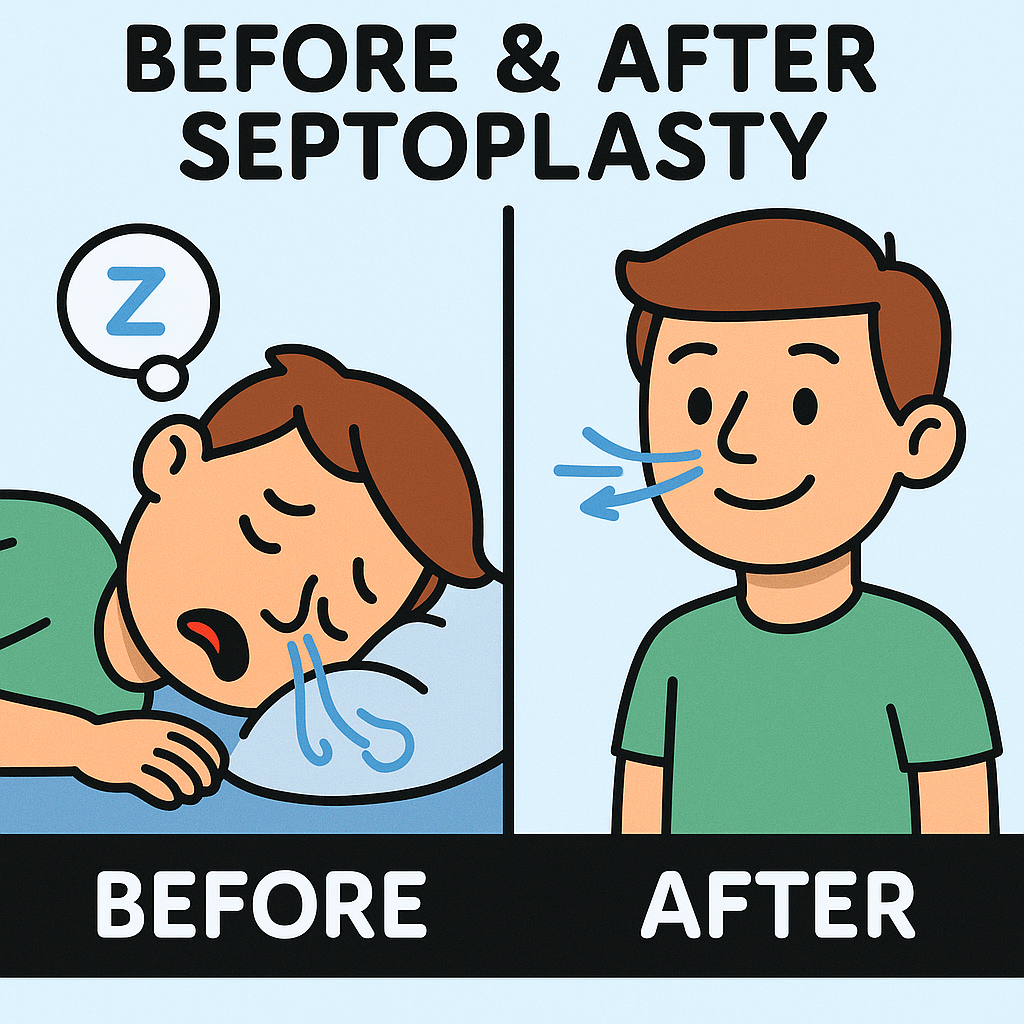👃 What’s Crooked in Your Nose? Understanding Deviated Septums and When to Fix Them

Health & Sciences | The Varrock Street Journal
Good morning, readers! Have you ever noticed you breathe easier through one nostril than the other? Or do you snore loudly, suffer from frequent sinus infections, or wake up with a dry mouth? The culprit might be something you can't see but affects millions of people every day—a deviated septum.
A friend of mine recently had this problem and decided to move forward with surgery to correct it. Like typical Varrock Street fashion, this made me curious about this medical condition and everything that comes with it. Today, we're diving into what a deviated septum is, why it happens, what risks it carries if left untreated, and how doctors can fix it through a procedure known as septoplasty.
🧬 What Is a Deviated Septum?
The nasal septum is the thin wall of cartilage and bone that divides your nose into two nostrils. In a perfectly aligned nose, air flows equally through both sides.
But in many people, this wall is crooked or shifted to one side—a condition known as a deviated septum.
- Mild deviations are very common and often go unnoticed.
- Severe deviations can block airflow, making breathing difficult and causing other problems.
Experts estimate that up to 80% of people have some degree of septal deviation, but not all require treatment.

🤔 What Causes a Deviated Septum?
A deviated septum can be present at birth or develop over time. Common causes include:
- Congenital: Present from birth due to developmental changes.
- Trauma: Injury to the nose (sports, accidents, falls).
- Growth Changes: Sometimes it becomes more noticeable with age.
Even small shifts can have big impacts if they block airflow or affect sinus drainage.

⚠️ Risks and Complications of Leaving It Untreated
Living with a significantly deviated septum can lead to:
- Chronic nasal congestion (always feeling “stuffed up”)
- Snoring and sleep disturbances
- Frequent nosebleeds
- Recurrent sinus infections
- Dry mouth from mouth breathing
- Facial pain or headaches
But the long-term impact goes deeper than just feeling congested:
- Reduced Oxygen Intake During Sleep:
A deviated septum can limit airflow on one or both sides of the nose, causing people to breathe through their mouth or experience shallow breathing at night. This can lower oxygen levels, leading to poor sleep quality, daytime fatigue, and in severe cases, contributing to sleep-disordered breathing like obstructive sleep apnea (OSA). - Heart and Brain Health Risks:
Over time, chronic low oxygen levels during sleep can increase the risk of high blood pressure, heart disease, and cognitive problems like poor concentration or memory issues.
🛠️ How Do We Diagnose It?
Doctors typically diagnose a deviated septum through:
- Medical history (trouble breathing, snoring, sinus problems)
- Physical exam using a nasal speculum or scope
- Imaging like CT scans in complex cases

🩺 Treatment Options: From Management to Surgery
✅ Non-Surgical Management
- Nasal sprays (steroid or saline) to reduce swelling
- Antihistamines or decongestants for allergy-related symptoms
- Nasal strips to open the airway temporarily
While these can help manage symptoms, they don’t correct the structural problem.
🏥 Surgical Treatment: Septoplasty
- Septoplasty is a surgical procedure that straightens the septum by trimming or repositioning the cartilage and bone.
- Usually performed under local or general anesthesia.
- Recovery involves a few weeks of healing, with most people experiencing significant relief in breathing, sleep, and sinus health.
🧠 Why This Matters
While a deviated septum isn’t life-threatening, it can seriously affect your quality of life. Breathing should feel effortless—not like a one-sided struggle.
Recognizing the signs and seeking evaluation can lead to simple fixes that improve sleep, breathing, and daily comfort. Septoplasty, when appropriate, is a highly effective solution with long-lasting benefits.
🌟 Spotlight on the Future
- Minimally invasive techniques are improving recovery times for septoplasty.
- 3D imaging and custom surgical planning are enhancing outcomes.
- In-office procedures may soon offer faster, less invasive options for mild cases.
As ENT (Ear, Nose, and Throat) technology advances, getting relief may become easier than ever.
Here is a video going over the details of a Septoplasty!
😲 Did You Know?
- Up to 80% of adults have some degree of septal deviation—most don’t know it!
- Septoplasty is often combined with other procedures like turbinate reduction to maximize breathing improvement.
- Some insurance plans cover septoplasty when breathing or sinus issues significantly affect health.
🧠 Reflection Questions
- Have you ever experienced chronic nasal congestion and wondered if a deviated septum might be to blame?
- How can healthcare providers help patients weigh the benefits and risks of surgery?
- What advancements could make septoplasty even less invasive in the future?
👋 Final Thoughts
Breathing should never feel like a chore. Whether it’s managing symptoms or considering surgery, knowing your options is the first step toward breathing easier and living better.
📚 References
American Academy of Otolaryngology–Head and Neck Surgery. (2024). Deviated Septum Overview. https://www.entnet.org
Mayo Clinic. (2024). Deviated Septum. https://www.mayoclinic.org/diseases-conditions/deviated-septum/symptoms-causes/syc-20351710
Johns Hopkins Medicine. (2024). Septoplasty. https://www.hopkinsmedicine.org/health/treatment-tests-and-therapies/septoplasty
ENT Specialists Singapore. (2024). What is a Deviated Nasal Septum?. https://entspecialistsingapore.com/deviated-nasal-septum/
Coastal Ear, Nose and Throat. (2024). Deviated Septum. https://coastalearnoseandthroat.com/all-uniform-content/deviated-septum/
📲 Breathe easier with us:
- Instagram: @thevarrockstreetjournal
- TikTok: @varrock.street.jo
